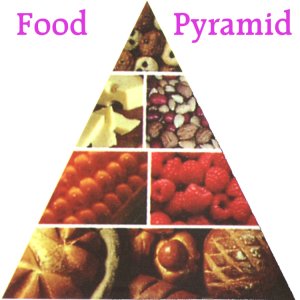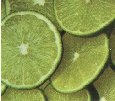|

Dietary Information
Vegetarianism is a very healthy option but you have to be conscious of what you eat to ensure you maintain a balanced diet. You could eat food that is vegetarian but isn't necessarily good for you at every occasion. But if you want to have a balanced diet there are a few simple guidelines to follow. A balanced diet should supply you with all the nutrients, vitamins and minerals you need to keep your body strong and healthy.

Below is a simple nutrition pyramid that shows quickly and easily how your food should be divided out. At the top are the things you should eat little of and have scarcely. These are the oils, butter, other fats and sweets. Then at the bottom there are the foods that should be plentiful in your diet. These are the bread, cereal, rice and pastas. Basically as long as you eat a variety of foods including grains, fruit and vegetables, beans, pulses, nuts or seed, a small amount of fat along with dairy products your diet should be a healthy and well-balanced one.

A balanced vegetarian diet is subdivided up into different categories. These are all listed and described below.
Protein - this helps growth and repair in the body.
A vegetarian gets protein from sources like - beans, nuts, pulses, eggs or dairy produce such as milk and cheese. Peanuts, peanut butter, sesame seeds, soya beans and other soya products are good sources of protein as well.

Carbohydrates - this helps the digestive system. It is also known as roughage and dietary fibre.

Carbohydrates are in plentiful supply in a vegetarian diet. They can be obtained from breads, rice, pastas, potatoes, jams and pulses.
Fat - this helps insulate the body and provide different flavours. Nowadays we are being asked to reduce the amount of fat in our diet - particularly saturated fat. In a vegetarian diet there is less saturated fat than in an omnivore diet. But you still have to be aware not to eat too much fat.
Fats can be obtained from butter, spreads and oils. It is a good idea to check the amount of saturated fat in reduced and low fat foods as it can be misleading. Oils that are to be recommend are olive oil and some vegetable oils. They contain fewer amounts of saturated fat generally.
Vitamins - there are many different types of vitamins. The main ones have been mentioned below. These are to keep the body healthy and all the different parts of it working well.
Vitamin A can be found in dairy produce, green vegetables and yellow-orange fruits and vegetables. It is usually quite well- supplied.
Vitamin B group is a group that need quite careful attention. There shouldn't be a lack of it in the diet if you eat wholegrain cereals, whole-wheat bread, some nuts and pulses, fresh fruit and vegetables. Other foods that are good sources are almonds, peanuts, sunflower and sesame seeds and some yeast extracts.
But there are a couple that need particular attention - that is folic acid and B12. A good source of these is Marmite but it does no harm to take a vitamin tablet containing these if you are quite worried. But they should be supplied I a balanced diet.
Vitamin C is plentiful in the vegetarian diet. This is because fruit and vegetables are usually in abundance in the vegetarian diet and these are the best sources for Vitamin C. But particularly good sources of it include oranges, lemons, limes, blackcurrants and strawberries.

Vitamin D isn't found in many foods. The main sources are eggs and fortified margarine. It would probably be wise to take a vitamin tablet containing this vitamin.
Minerals - there are several important ones like calcium and iron that you have to be careful of.
Iron can be obtained form lentils, the soya bean and it's products, dried fruits, whole grains, broccoli, dark green leafy vegetables, nuts and seeds. It is one mineral that should be paid attention to particularly for women
Calcium can be obtained from dairy products for vegetarians. But if you are vegan this could be a bit of a problem. They can get calcium from other sources like broccoli, soya beans and soya products, almonds, sunflower seeds, sesame seeds and brazil nuts.
© VegIreland 2000
